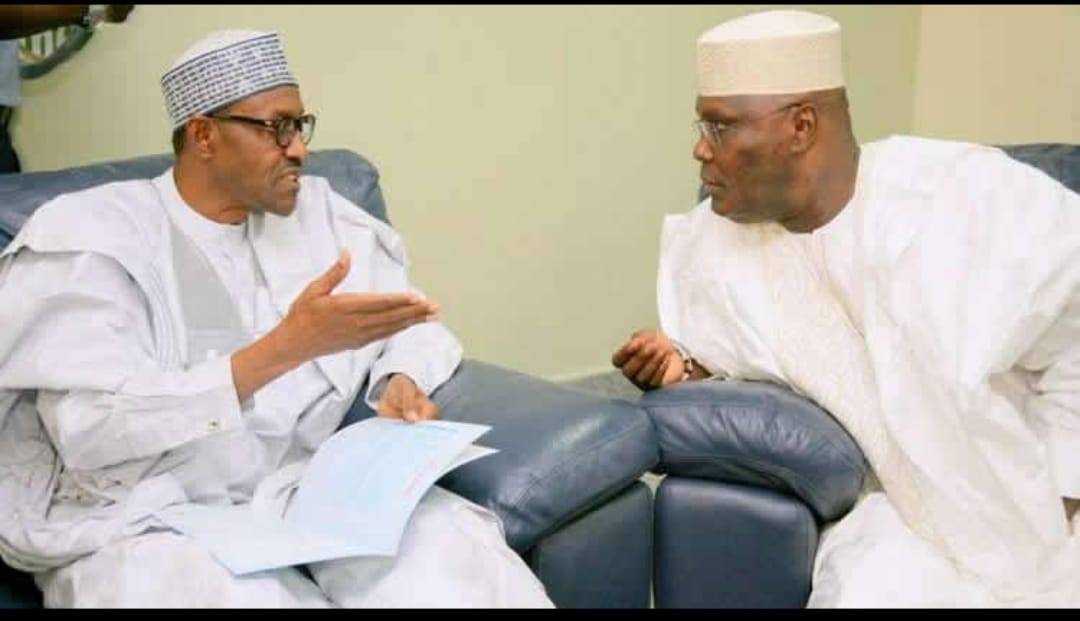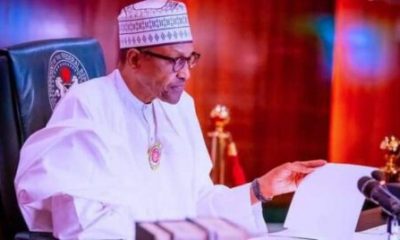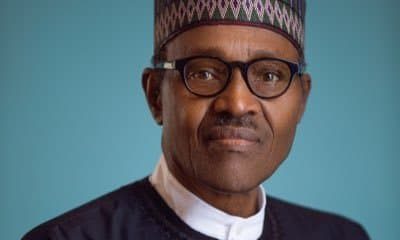Politics
2027: Ganduje Reacts to Atiku Visit to Buhari Amid Coalition Talk
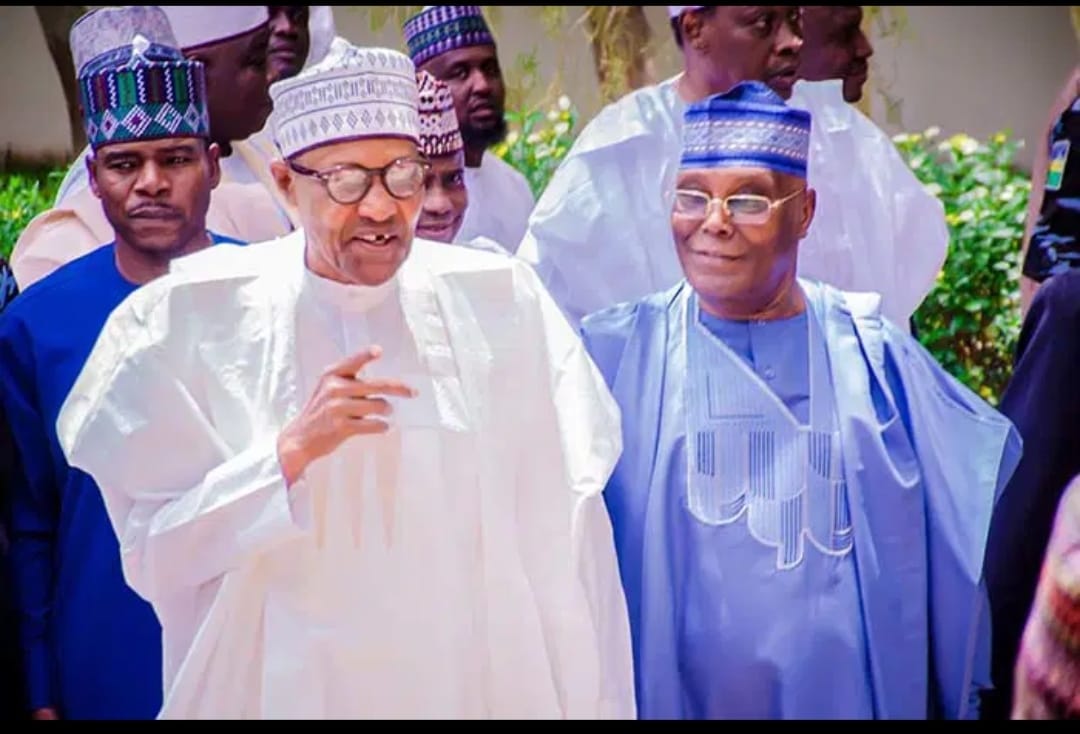
2027: Ganduje Reacts to Atiku Visit to Buhari Amid Coalition Talk
By George Omagbemi Sylvester
As Nigeria hurtles toward the 2027 general elections, political fireworks have already begun to explode across the landscape. One of the most riveting developments came when former Vice President and perennial presidential contender Alhaji Atiku Abubakar paid a high-profile visit to former President Muhammadu Buhari in Daura. The visit, cloaked in civility but loaded with political undertones, has sparked a national debate and provoked strong reactions — notably from the embattled National Chairman of the All Progressives Congress (APC), Dr. Abdullahi Ganduje.
To the untrained eye, the visit might seem like an innocuous gesture of statesmanship. But seasoned political observers know that in Nigeria’s murky political terrain, no handshake is ever just a handshake. It is a message. It is a signal. It is a strategic move.
Ganduje’s Defensive Rhetoric: A Crumbling Empire?
Dr. Ganduje, already struggling to hold together a fractured APC, dismissed the meeting as a “media stunt” and accused Atiku of playing games to revive his waning relevance. “Atiku is grasping at straws,” Ganduje said during a press briefing in Abuja. “The APC is not a refuge for failed PDP politicians looking for political asylum.”
This fiery response, however, betrays more than it conceals. Political insiders say Ganduje’s anxiety stems from the growing disillusionment within the APC and the rising popularity of coalition talks aimed at dislodging the party that has presided over Nigeria’s most turbulent democratic decade. The once-dominant APC is now battling factionalism, leadership instability, and widespread public disdain.
A Possible Coalition: The Night the Elephant Danced With the Lion
If reports are to be believed, Atiku’s visit was not merely ceremonial. Sources close to both camps suggest that discussions are underway to explore a “grand coalition” that could bring together influential political actors from both northern and southern Nigeria to unseat the APC in 2027. Buhari, known for his silence, has not disavowed the talks, fuelling speculation that even he, the supposed “father of APC,” is growing disenchanted with the party’s direction.
Political coalitions are not new in Nigerian history. In fact, the APC itself was born from a coalition of disillusioned politicians in 2013. However, what makes this possible Atiku-led coalition unique is its potential to merge ideological enemies into a common force against a greater evil — political stagnation and national decline.
Nigeria in Decline: The APC’s Legacy of Chaos
Since 2015, when the APC took power under Buhari, Nigeria has witnessed nothing short of a national collapse. The economy is in tatters, with inflation soaring above 33% and unemployment crossing 40% by the end of 2024. According to the World Bank, Nigeria has become the world’s poverty capital, overtaking India with over 71 million people living in extreme poverty.
“Corruption, insecurity, economic mismanagement — the APC has failed Nigerians on every front,” says Dr. Kingsley Moghalu, economist and former presidential candidate. “The social contract between the government and the people has completely broken down.”
This collapse is not an exaggeration; it is a documented reality. Under APC rule, Nigeria has witnessed the devaluation of its currency, mass emigration of youth through the “Japa syndrome,” and the near-total breakdown of law and order. From Boko Haram to banditry to IPOB agitations, the country is increasingly ungovernable.
Atiku’s Calculated Return: Statesman or Strategist?
Atiku’s critics accuse him of opportunism, but his supporters view him as a resilient statesman seeking to rescue a broken nation. “Atiku is Nigeria’s most consistent political figure of the Fourth Republic,” said Professor Jibrin Ibrahim, a political scientist with the Centre for Democracy and Development. “His visit to Buhari may be the beginning of a national healing process.”
Indeed, if a coalition is to succeed, it needs to be broad-based, multi-ethnic, and pragmatic. Atiku’s long-standing relationships across Nigeria’s geopolitical zones could be the glue that binds a new political force. His vision of restructuring, economic liberalism, and national unity resonates with many young Nigerians disillusioned by tribal politics and nepotism.
Ganduje’s Irony: A Man Without Moral Standing
Ganduje, who has repeatedly denied allegations of corruption despite viral videos allegedly showing him collecting bribes in dollars, is hardly the voice of moral authority. His continued leadership of the APC is viewed by many as a stain on the party’s image.
“Nigerians are tired of recycled corruption,” said Nobel Laureate Wole Soyinka. “The country needs a clean break from the past, not a recycling of those who have contributed to its downfall.”
Ganduje’s rejection of coalition talks, therefore, comes across as both hypocritical and desperate. His primary concern is not the party’s future or the country’s stability — it is the preservation of his dwindling influence.
A Coalition That Could Save Nigeria
A possible Atiku-led coalition could include the PDP, disgruntled APC members, Labour Party elements, and regional powerbrokers. If successful, it would mark a turning point in Nigeria’s political history — a united opposition front committed to real reforms.
The late Nelson Mandela once said, “It always seems impossible until it’s done.” In Nigeria, many believed the APC’s defeat was impossible until 2015 proved otherwise. 2027 could once again be the year Nigerians rise against incompetence and reclaim their democracy.
To achieve this, the coalition must focus on a common minimum agenda: restructuring, economic revitalization, job creation, security reform, and judicial independence. It must also avoid the mistakes of the past — internal sabotage, regional bias, and political greed.
Voices from the Global Stage
Former U.S. President Barack Obama once remarked, “Africa doesn’t need strongmen; it needs strong institutions.” Nigeria has had enough of strongmen who use institutions as personal weapons. The time has come for an alliance that will rebuild institutions, restore confidence, and rejuvenate hope.
Renowned economist Jeffrey Sachs emphasized, “Good governance is the single most important factor in eradicating poverty and promoting development.” Nigeria’s tragedy is that it has been governed by those more interested in power than purpose. The 2027 coalition must reverse this pattern.
The Verdict of the People
Ultimately, it is not Ganduje, Atiku, or Buhari who will determine Nigeria’s fate in 2027 — it is the Nigerian people. And the people are watching, listening, and preparing. They have endured inflation, fuel scarcity, unemployment, and insecurity. Their anger is reaching boiling point.
As author Chinua Achebe wrote, “The trouble with Nigeria is simply and squarely a failure of leadership.” That failure must end. If a coalition offers even a glimmer of competent leadership, then history will remember Atiku’s visit to Buhari not as an act of desperation, but as the moment the winds of change began to blow.
Conclusion: A Nation at the Crossroads
Nigeria stands today on a knife’s edge. The old order is cracking, and a new vision must emerge. Ganduje’s hostility to coalition talks is a symptom of a frightened political class clinging to a failed status quo. But history is merciless to those who stand in the way of progress.
The 2027 elections could either be the beginning of national rebirth or the final nail in Nigeria’s democratic coffin. The choice is ours.
Politics
Gov. Dauda Lawal commissions projects in Anka LGA, Commits to Sustainable Development

Gov. Dauda Lawal commissions projects in Anka LGA, Commits to Sustainable Development
The Executive Governor of Zamfara State, Dr. Dauda Lawal, has reiterated his administration’s steadfast commitment to guiding Zamfara State towards sustainable development by inaugurating and initiating a series of pivotal projects in the Anka Local Government Area.
Among the key undertakings announced are the comprehensive reconstruction and modernization of the Emir of Anka’s palace, signaling a revitalization of traditional leadership; the initiation of work on the crucial Anka–Abbare Road, which is expected to significantly improve connectivity; and the construction of a new Local Government Secretariat.
Additionally, the projects encompass the establishment of dedicated offices for the Hisbah Commission and the Community Protection Guards, alongside the reconstruction of the Safe School in Anka, emphasizing the administration’s focus on enhancing educational infrastructure.
During the commissioning event, Governor Lawal highlighted that these projects are a fulfillment of commitments made during his campaign, aimed at transforming the local landscape by improving infrastructure, stimulating economic growth, bolstering public service efficiency, and enhancing the capacities of security agencies. He called for a collective effort from the community to ensure proper maintenance of these facilities, underscoring the shared responsibility in preserving public assets.
Governor Lawal shared that similar projects have also been inaugurated in Tsafe, with plans for upcoming projects in Kaura Namoda, Moriki, Bungudu, Bukkuyum, and Zurmi, all expected to be completed and inaugurated by the year’s end. This ambitious timeline reflects the administration’s urgency in addressing the development needs of various regions within the state.
In his remarks, the governor urged residents and local traditional institutions to collaborate closely in maintaining the newly commissioned structures and supporting the overarching objectives of his administration. “I stand here in Anka today to honor our commitments to the people of Anka Local Government and all of Zamfara State. The official opening of the new palace for the ‘Sarkin Zamfaran Anka’ and the Zamfara State Council of Chiefs is a significant milestone that wraps up today’s agenda,” he stated.
Governor Lawal emphasized the strategic importance of the Anka–Abbare Road, describing it as a critical artery that will not only enhance access to remote areas but also stimulate economic activities and generate multiplier effects throughout the local economy. He articulated the necessity of providing a conducive work environment for civil servants, affirming that the new local government secretariat and dedicated offices will significantly contribute to strengthening law and order within the state.
“Education is the cornerstone of any thriving society. Our focused initiatives are oriented towards fostering a safe, secure, and supportive environment for our students. I am also proud to announce the completion and commissioning of the reconstructed SAFE School Anka today,” he remarked, reaffirming the administration’s dedication to education.
The governor further noted that the commissioning of the Emir’s Palace serves to restore the historical prominence of traditional institutions, which he regards as pivotal custodians of the region’s culture and heritage. He underlined the administration’s awareness of the invaluable role that these institutions play in fostering the state’s growth and emphasized the necessity of aligning development projects with cultural values.
In conclusion, the governor mentioned that after the successful commissioning in Anka and Tsafe, future projects in Kaura Namoda and Moriki will follow suit, while those in Bungudu, Bukkuyum, and Zurmi remain on track for completion and official commissioning before the year concludes.
news
GEN CHRISTOPHER GWABIN MUSA SUPPORT INITIATIVE HAILS GOVERNOR UBA SANI’S APPOINTMENT AS RENEWED HOPE AMBASSADOR
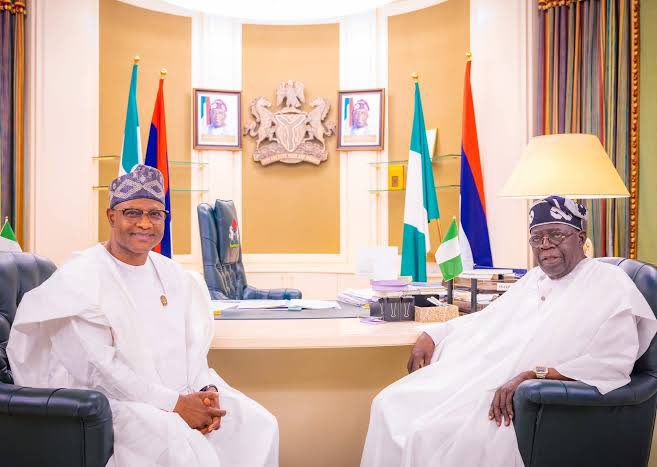
GEN CHRISTOPHER GWABIN MUSA SUPPORT INITIATIVE HAILS GOVERNOR UBA SANI’S APPOINTMENT AS RENEWED HOPE AMBASSADOR
The Gen Christopher Gwabin Musa Support Initiative (GCGMSI) has extended its warm congratulations to His Excellency, Mallam Uba Sani, the Executive Governor of Kaduna State, following his recent appointment as a Renewed Hope Ambassador and Deputy Director-General for Party Outreach, Engagement, and Mobilisation by the All Progressives Congress (APC).
This felicitation was formally conveyed in a statement signed by the Initiative’s Convener, Ibrahim Dahiru Danfulani, Sadaukin Garkuwan Keffi/Betara Biu, and disseminated to the press.
The statement highlighted that the Grand Patron of the GCGMSI, His Excellency General Christopher Gwabin Musa, OFR, Minister of Defence of the Federal Republic of Nigeria, received the news of the appointment with great pride but without surprise. According to the statement, General Musa expressed unwavering confidence in Governor Uba Sani’s proven capability and salient leadership qualities, affirming that the Governor is eminently equipped to deliver on every task entrusted to him.
The Grand Patron further extended profound appreciation to the President and Commander-in-Chief of the Armed Forces, His Excellency Asiwaju Bola Ahmed Tinubu, GCFR, for recognising and finding Governor Uba Sani worthy of this critical national assignment. The appointment, which takes effect immediately, was made by the President in his capacity as the leader of the APC, citing the Governor’s exceptional organisational abilities and strategic acumen.
In his new role, Governor Sani is tasked with working in close collaboration with the Director-General of the Renewed Hope Ambassadors and the party hierarchy, including the National Chairman of the APC. His primary mandate is to ensure harmony, inclusiveness, and strategic coordination across all levels of the party’s mobilization and engagement architecture, a vital function for advancing the political agenda.
Demonstrating its commitment to national service and effective governance, the GCGMSI, under the direct directive of its Grand Patron, General Musa, has officially mobilised its formidable structure. The Initiative has pledged the full deployment of its extensive network, seasoned personnel, and robust operational framework to assist and support Governor Uba Sani in the successful execution of his new responsibilities.
The Gen Christopher Gwabin Musa Support Initiative, renowned for its disciplined organisation, widespread grassroots penetration, and capacity for large-scale civic mobilisation, stands ready as a pivotal force. This move underscores the GCGMSI’s pivotal role as a key support system for national development initiatives and its unwavering dedication to fostering unity and progress under the Renewed Hope agenda.
Politics
Oyo 2027: Ajadi Says PDP Will Retain Power
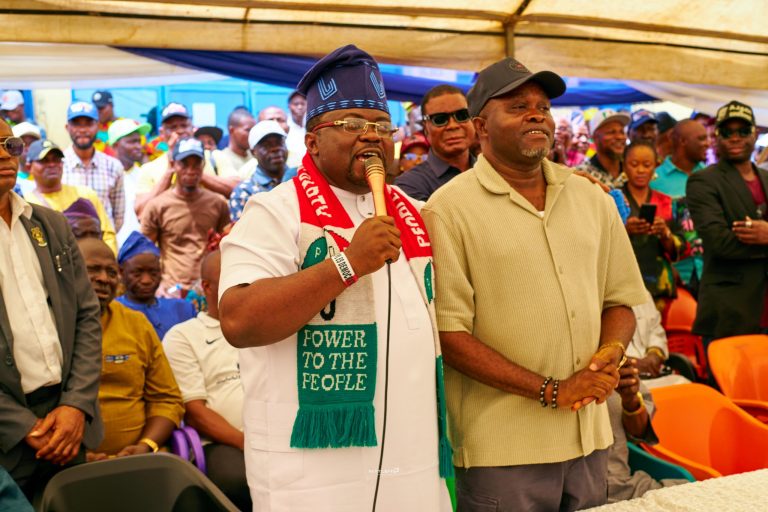
Oyo 2027: Ajadi Says PDP Will Retain Power
…..Tasks PMS To Remain United, Peaceful
A leading People’s Democratic Party (PDP) governorship aspirant in Oyo State, Ambassador Olufemi Ajadi Oguntoyinbo, has urged the people of Oyo State to remain steadfast, saying they will continue to enjoy good governance because the PDP will produce the next governor in the 2027 general elections.
Ajadi, who made this known while addressing transport unions under the Park Management System (PMS) at their headquarters, New Garage, Ibadan, on Tuesday, urged the park managers to remain united and maintain the love and peace currently prevalent among them.
According to him, “My advice to the Park Managers and the commercial drivers in Oyo State is that they should continue the love and peaceful attitudes. They should remain united. They should not ‘scattelegs’.
“Don’t let anybody deceive you, remain steadfast. Let me assure you that our party, the PDP, will produce the next governor come 2027,” Ajadi said.
He said he came to the PMS headquarters to meet with transporters and park managers to inform them of his aspiration to serve the people of Oyo State as governor come 2027.
“Today I joined my people, the park managers in Oyo State, to familiarize myself with them and inform them of my intention to serve the people of Oyo State as the next governor by the Grace of God.”
On the plans for the transporters, Ajadi said he first wants to change the look of the City Cabs, which will be done in collaboration with the Park Management System.
He also plans to increase the number of Mass Transit buses and make them available in all locations of the State.
He said the Mass Transit buses will operate in partnership with the Park Managers.
Ajadi, who commended Governor Makinde on the newly established bus terminals in the State, said his government will ensure adequate usage of the facilities.age of the facilities.
-

 celebrity radar - gossips6 months ago
celebrity radar - gossips6 months agoWhy Babangida’s Hilltop Home Became Nigeria’s Political “Mecca”
-

 society6 months ago
society6 months agoPower is a Loan, Not a Possession: The Sacred Duty of Planting People
-

 society5 months ago
society5 months agoReligion: Africa’s Oldest Weapon of Enslavement and the Forgotten Truth
-

 news6 months ago
news6 months agoTHE APPOINTMENT OF WASIU AYINDE BY THE FEDERAL GOVERNMENT AS AN AMBASSADOR SOUNDS EMBARRASSING


